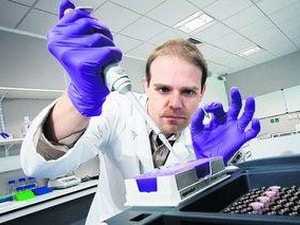New technique increases the effectiveness of artificial insemination
Last June, a healthy baby boy was born using in vitro fertilization (IVF) using next-generation genetic screening techniques, selecting the embryos with the highest chance of survival for IVF.
This new method (NGS) uses DNA sequencing techniques to detect chromosomal abnormalities and defective genes before the embryo is implanted in the uterus.
During infertility treatment, many embryos are created but very few of them can develop into fetuses due to genetic abnormalities, according to the study's author, Dagan Wells of the NIHR Biomedical Research Centre at the University of Oxford.

Dr. Dagan Wells. (Source: oxfordtimes.co.uk)
NGS allows for increased detection of these abnormalities and helps identify which embryos have the highest chance of developing into fetuses for implantation in the uterus.
Stuart Lavery, head of the IVF department at Hammersmith Hospital in London, said the new technique offers better genetic diagnosis before embryo implantation, but a randomised trial is needed to confirm its accuracy.
Mr. Wells had previously tested the method with high results on "abnormal" embryos in the lab, then used it to help two couples using IVF. Two women were aged 35-39 and one had suffered a miscarriage.
This method identified three healthy embryos (pre-embryos), then each wife was implanted with an embryo and all had healthy pregnancies.
The first pregnancy resulted in the birth of a healthy baby boy in June in Pennsylvania. The second is also due.
According to Mr. Wells, the new method has a low cost, only about 50-70% compared to the cost of the current chromosome screening method. Currently, the embryo screening method in IVF is used for older women with high risk of chromosome abnormalities and those who often have miscarriages.
Only about 30% of IVF pregnancies are successful and the cause of this condition is unknown, but it is suspected to be due to a genetic defect.
According to the European Society of Human Reproduction and Embryology (ESHRE), 1 in 6 couples in the world experience fertility difficulties at least once in their lifetime./.
According to (TTXVN) - VT






